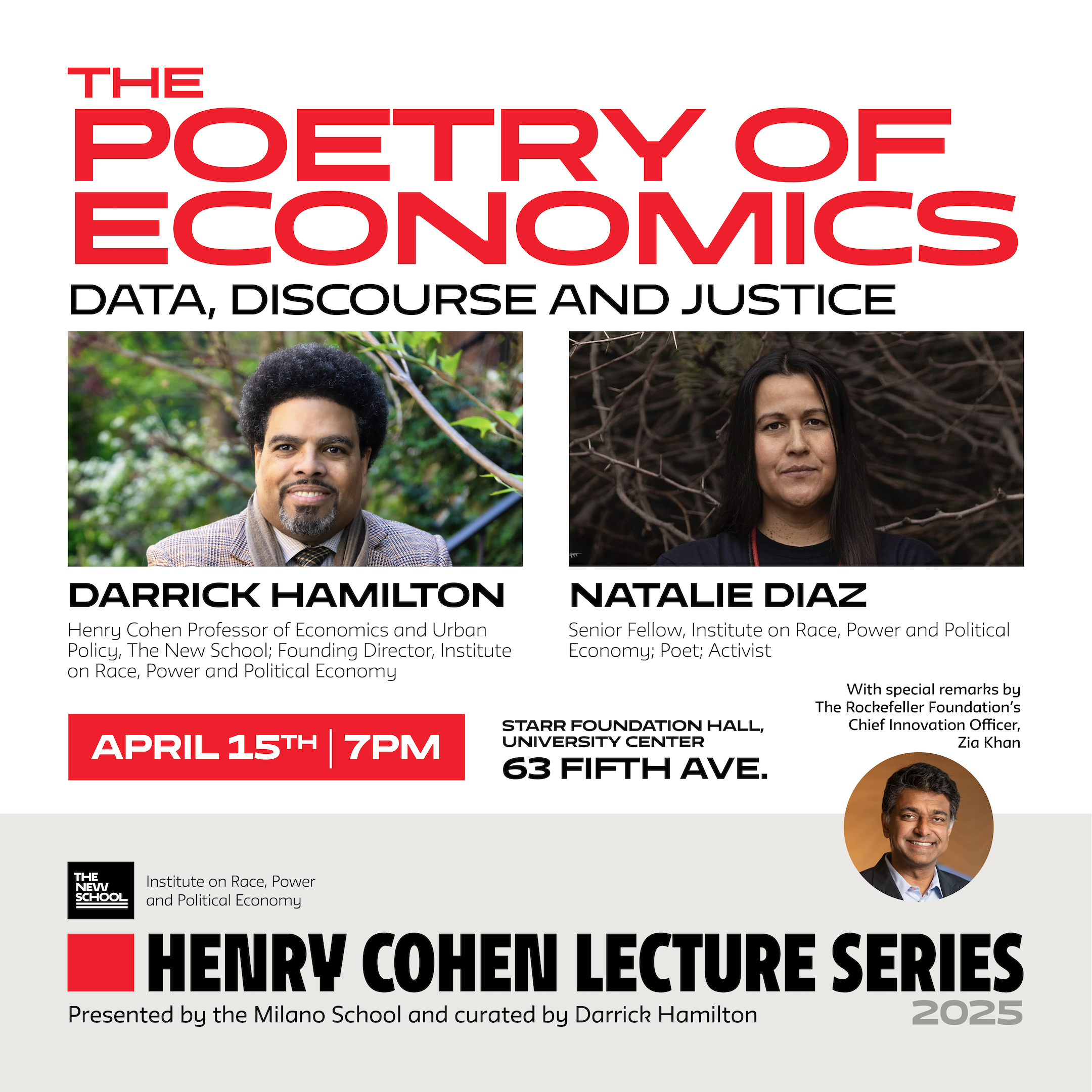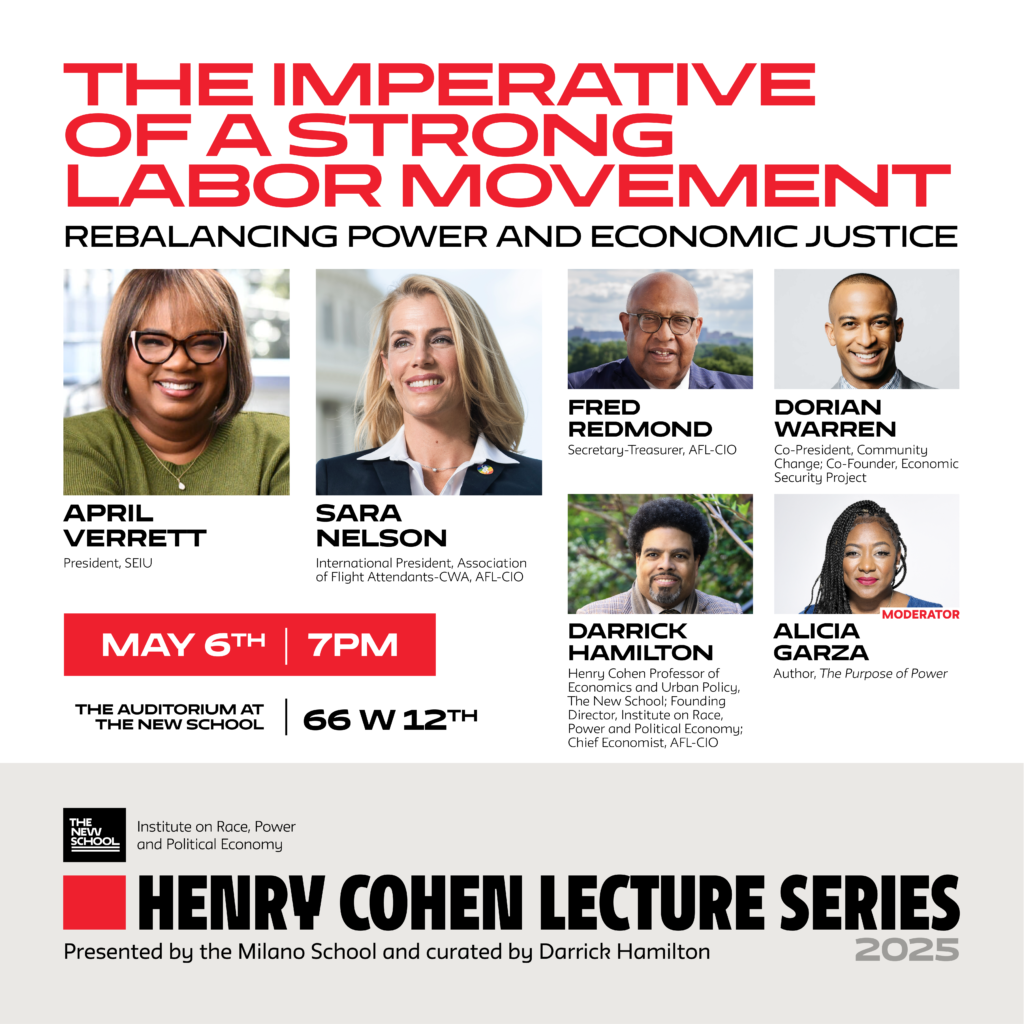
- This event has passed.
2025 Henry Cohen Lecture Series: The Poetry of Economics
April 15 @ 7:00 pm - 9:00 pm

Join us at The New School’s Starr Foundation Hall on Tuesday, April 15 as our 2025 Henry Cohen Lecture Series continues with an intimate conversation featuring Pulitzer Prize-winning Mojave poet, activist, and educator Natalie Diaz and Institute Founding Director Darrick Hamilton on the poetry of economics, with special remarks from The Rockefeller Foundation’s Chief Innovation Officer Zia Khan.
Together, Diaz, Hamilton, and Khan will examine the relationship between art and capital while reflecting on the role of data and discourse in the movement for justice.
Speakers:
- Natalie Diaz, Senior Fellow, Institute on Race, Power and Political Economy; Poet; Activist
- Darrick Hamilton, Founding Director, Institute on Race, Power and Political Economy
- Zia Khan, Chief Innovation Officer, The Rockefeller Foundation
This event is part of the 2025 Henry Cohen Lecture Series, which brings leading thinkers, changemakers, policymakers, journalists, and activists to The New School to present their perspectives and explore the intersections of race, social stratification, and political economy that inspire economic and racial justice.
Register Now
Presented in partnership with the Institute on Race, Power and Political Economy and the Milano School of Policy, Management, and Environment at The New School.
EVENT RECAP
On Power, Poetry and Paradigms: A Dialogue for a Just Economy
By Madeline Neighly, Senior Strategist and Researcher
We are living through a moment of transition, a rupture that lays bare the fragility of our institutions. In moments of change comes opportunity. In this liminal space between what was and what can be, we are tasked not simply with critique but with construction. The Poetry of Economics: Data, Discourse and Justice brought together Pulitzer Prize-winning Mojave poet, activist and educator Natalie Diaz, Institute Founding Director Darrick Hamilton, and The Rockefeller Foundation’s Chief Innovation Officer, Zia Khan, to explore the moral architecture of our economy and to elevate the cultural, emotional, and structural conditions necessary to build a more just and humane future.
The Need for a New Paradigm
Zia Khan, reflecting on time the three shared at the Bellagio Center, opened with the reflection that we are witnessing the collapse of old norms, which presents both danger and opportunity. What we build next will depend on whether we are bold enough to center people, not just as economic agents but as full human beings embedded in community, culture, and care.
While the discipline of economics purports to be value-neutral, devoid of emotion or ethics, it is suffused with values. To bring economics in conversation with poetry, which makes room for questions, allows us to ask questions around justice, to ask what are the values that suffuse our economy and for whom do they work?
Love and Power: The Foundations of Justice
Hamilton brought the moral clarity of Rev. Dr. Martin Luther King, Jr. into the room with the quote, “Power properly understood is nothing but the ability to achieve purpose. It is the strength required to bring about social, political, and economic change. What is needed is the realization that power without love is reckless and abusive, and love without power is sentimental and anemic.”
This, the speakers agreed, is the crux of our moment. Love and power must walk together. At the Institute this is not just abstract, it is our foundation, guiding our work on ensuring that policy is both rigorous and rooted in human flourishing.
Diaz carried this forward, reminding us of the origins of our words. “Data,” she shared, once meant “to give.” It was an act of generosity not the extraction it so often is today. Similarly, “power” once described what was possible, keeping us on the precipice of possibility. These origins matter. They remind us that our current understanding of these words themselves, and thus our thinking, has been narrowed and weaponized. Poetry, however, offers a different way to live and to think, one that returns these words to the body, to community, to care.
The Dangerous Story
As their dialogue continued, Hamilton and Diaz explored the question of stories—how they’re told, who gets to tell them, and what power they hold. Diaz warned that today’s silencing, much of it self-imposed from fear, is a freeze not only of speech but of imagination. The most dangerous story, she reminded us, is the one that asks how we got here, because it is the one connected to what we have left to do.
Hamilton confessed that he sometimes hides in the analytical language of economics because the stories of his community and his upbringing are painful. But those stories are the reasons he fights. Walking through his transformed neighborhood, when he sees who is thriving and who is not, he is aware that nothing is different about the people there before and those there today, it is the conditions afforded them. This, he notes, gives you clarity and solution, if conditions are changed then so will be outcomes.
Diaz read Etheridge Knight’s “Feeling Fucked Up,” invoking the righteous anger and justifiable grief that fuel creative resistance. “We are allowed to be angry,” she shared. “We should be angry.” It is dangerous not to find the language of anger. Anger, like love, can be a generative force.
Curiosity as Resistance
Both Diaz and Hamilton critiqued orthodox economics’ lack of curiosity. It functions as a static definition of value imposed by those with the privilege to codify norms and the power to determine who counts. In this framework, approaches rooted in lived experience, community care, and moral urgency are dismissed as subjective or sentimental.
But the future demands a new lens.
Diaz introduced the idea of the speculative as a necessary practice. We talk of the future as if it will simply arrive, but justice demands we shape it. The speculative invites us to imagine conditions beyond the limitations of current policy. It demands we stay curious, that we resist being diminished, and that we hold space for beauty, grief, rage, and joy.
The Work Ahead
At the core, then, is the question: what is economics for?
If economics is, in fact, the study of how we care for one another, how we structure our collective lives, then love must not be an afterthought. It must be central. Not only as a value, but as a verb, a design principle. Both an input and an output.
In this new future, identity will have no transactional value, no identity will be privileged above another. And, our identities will continue to be our cosmologies, the ways we dream.
The work ahead is clear. We must confront the hegemony of narrow metrics and usher in an economy rooted in love, in justice, and in truth. We must tell dangerous stories that refuse erasure and remember our past so that we can dream and imagine our future. Above all, we must remain curious because, as Khan noted, on the other side of all these other sides is us.

